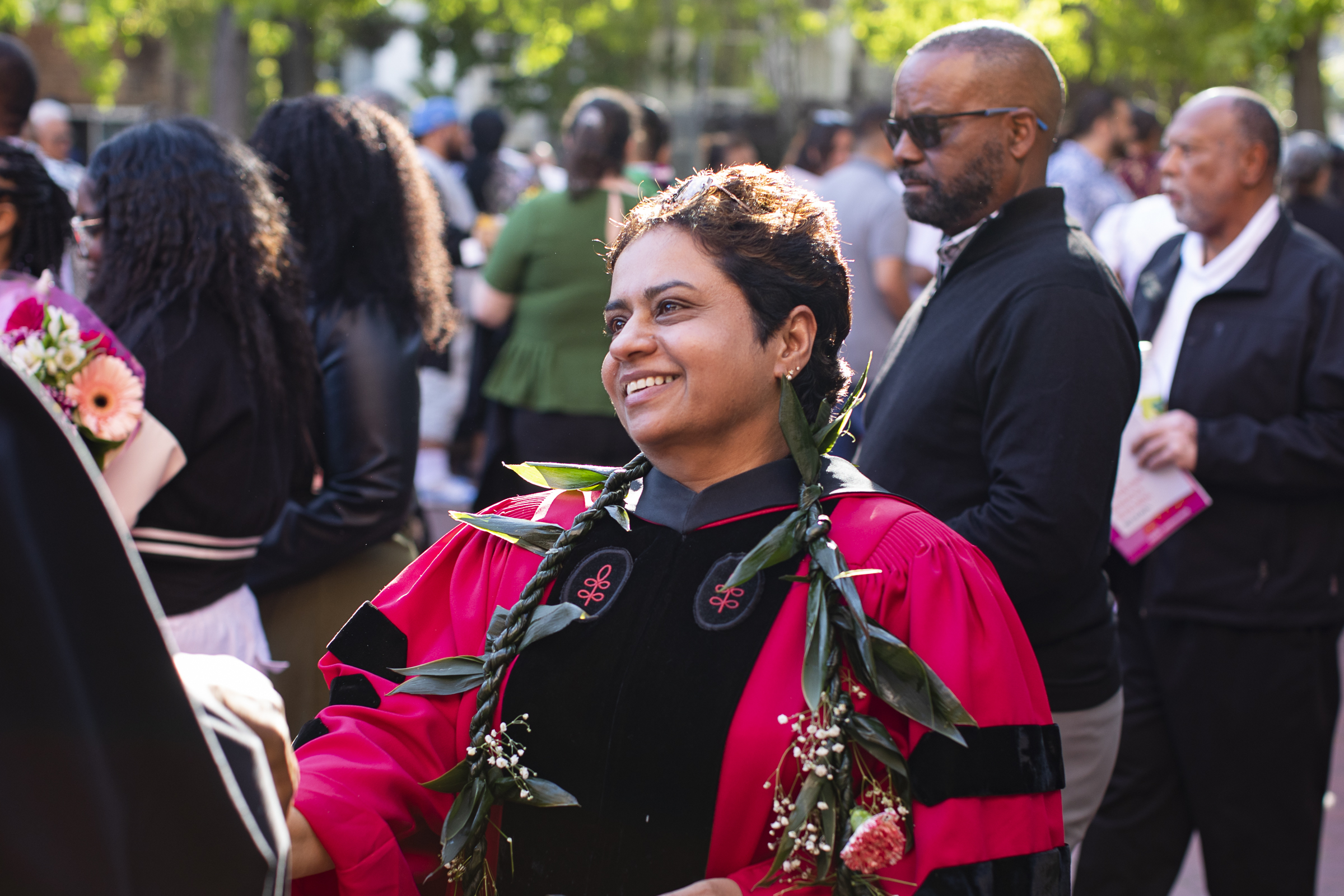This story is adapted from Dean Susan Abraham’s Valedictory Charge at Pacific School of Religion’s 156th Commencement on May 21, 2023.

Congratulations, class of 2023 at Pacific School of Religion. You have made us proud in so many ways, but above all, we, the staff and faculty at PSR are proud of your efforts to finish your academic career here at PSR with integrity, perseverance, and a sense of purpose.
As I have said many times before today, this moment and time of bidding you farewell and Godspeed is one that I have been counting down to, ever since you arrived here.
Yet, three or four years ago when many of you arrived here, none of us could have dreamed of the challenges that laid waste to our best-laid plans to get you all out of school as efficiently and quickly as possible. We human beings know this kind of thing can happen, as it did to our ancestors, who prevailed because they were convinced of the faithfulness of God.
The pandemics of COVID and racism almost did us in. Yet, you persevered and demonstrated what great resilience looks like. The epidemic of gun violence in this country creates despair and pain that is surging unabated. Yet, you have shown us how you embrace faith even in the face of death. Our planet and our world are on a calamitous trajectory to destruction. And you have shown us how we can practice hope by planting seeds of life wherever we are. There is more for you to think about, as you get ready to step out into the world, a world in which danger is actually alluring and falsely comforting. It is to this last that I will focus some of my comments today.
We are caught in a confusing web of individualist rhetoric spurred on by what I am calling Christian Capitalism on the one hand, and on the other, Christian Nationalism, an obscene and idolatrous narrative of collectivity that uses the name of religion to shore up a racist and virulent power structure. Neither of these are conducive to the strategic solidarities that we urgently need.
Resmaa Menachem, in his book My Grandmother’s Hands, says, “The deadliest manifestation of white fragility is its reflexive confusion of fear with danger and comfort with safety.” I would argue that such fragility is not limited to white-identified bodies alone; such fragility is cultivated in us by forms of Christian Capitalism which encourage us to seek comfort, convenience, choice, competitiveness, and the circus as if these are absolutely necessary for our lives.
That form of individualism, however, needs a mythical container, a narrative of superiority and power, a narrative of “the greatest nation on earth,” that seems to assure each of us that these five Cs are guaranteed to us as our birthright. If you think about it though, the demand for one’s personal comfort comes at the expense of others who need to labor on behalf of everyone else to create that comfort. The demand for convenience, similarly, uses precious resources of time, money, and creativity to pander to an ever-gluttonous desire for satiety and personal satisfaction. Choice, that great prop of Christian Capitalism, thinks of everything, from religion to goods and services, to relationships and work — in and for community — as an act of capitalist freedom, ignoring, once again, that choice is extractive, and its effects remain hidden. An inconvenient truth. Christian Capitalism may or may not be oriented towards a community’s health and well-being (because one can coat it in the garb of “doing good”) but it subtly and slyly cultivates competitiveness for the finite resources of any community.
And, finally, the circus. We live in a culture that is exceedingly good at creating distractions and our only demand is that these distractions remain entertaining. Comfort, convenience, choice, competition, and the circus are extractive. And anesthetizing. Unthinkingly, we are participating in the rituals of supremacy, because when any of these Cs are interrupted or interrogated, we react in fear, a sense of danger, and perceived lack of safety. We then are unable to create those solidarities that can challenge and overturn the mechanisms of supremacy.
Graduates, I appeal to you today to think of the Christian story as one that would challenge any of the five Cs I have spoken about and as one that condemns the narrative of “The Nation” as a form of basest idolatry. For this, I ask you to continue to practice what you have learned here in this community.
Read. Read queerly. By this, I mean that you need to bring a leaky self to the work of liberation. Your work must liberate many, not just one or two. Read to breach the boundaries of me and mine. Read, for surprise. Read for discomfort. Read for grief. Read to reach out and touch the sadness of the world that you are being called to heal. READ.
Write. This is hard. Writing is uncomfortable. It is difficult. It is a chore. We’d rather be distracted. Write with honesty, with integrity, and with conviction. Write, because writing purifies thought, it helps create empathic connections in the mind and it communicates to generations yet to come. Write, because it is a very dangerous activity. Write songs, essays, books, poetry, drama, sermons, and syllabi. WRITE.
Speak. Speaking is easy often, but right speaking, precise speaking, inspiring speaking, only comes out of discipline, study, and prayer. Speak to heal the world, to repair the world, to love the world. Watch and pray that your words are not simply reflections of yourself but are like butterfly wings—words that will slowly, but surely reverberate in ways that are unimaginable to you, to us. SPEAK.
Pray. We are scholars and students of religion, who sometimes forget that we need to inhabit the context of religious traditions. From Judaism’s demand for Tikkun Olam or Islam’s demand to submit to the will of the Almighty, to Buddhism’s deep theological and epistemological challenge to the naming and domestication of God, to Hinduism’s acknowledgment of divine and human plenitude, and Jesus’s plea to love each other as he taught us to do, you are called to be prophets of an extraordinary life—one that hands over to the Divine, in prayer and contemplation—one’s needs for comfort, convenience, and choice. PRAY.
It is not going to be easy. Some will call you delusional. Or brainwashed. And unpatriotic. But you already know what that is like. As a community, we read, and wrote, and spoke and prayed, when a global pandemic attempted to dim our light. We prayed and spoke and wrote and read when our brother, Isamaeli (Eli) Mata’afa was murdered, to strengthen our resolve. Despite the many, many demands on your own time and energy, because of family, finances, and health, you persevered. You know how to do challenge. You’ve got this.
You are examples of great resilience, in your practices of hope and faith, you will teach the rest of us how to create a world anew.
Today you become forever part of the PSR family. We are bound to you as you are bound to us. We are unspeakably proud of each one of you. We will follow where you will dare to lead. Go and do great things, wonderful things, loving things, in the manner of the One that called each of us into being. In my community in India, there is a form of leave-taking that asks: May I return? The response to this question is: Go. I say to you, Go. And return. We will be waiting with arms and hearts wide open.
——————————
Dr. Susan Abraham is Professor of Theology and Postcolonial Cultures, Vice President of Academic Affairs, and Dean of Faculty at Pacific School of Religion. She is the author of Identity, Ethics, and Nonviolence in Postcolonial Theory: A Rahnerian Theological Assessment (Palgrave Macmillan, 2007) and co-editor of Shoulder to Shoulder: Frontiers in Catholic Feminist Theology (Fortress, 2009). Ongoing research projects include issues in theological education and formation, interfaith and interreligious initiatives for social transformation, theology and political theory, religion and media, global Catholicism, and Christianity between colonialism and postcolonialism.
